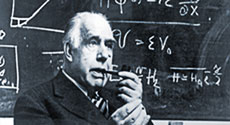Niels Bohr Lecture by Vincenzo Vitelli
Odd Turbulence
Abstract: Fully developed turbulence is a universal and scale-invariant chaotic state characterized by an energy cascade from large to small scales where the cascade is eventually arrested by dissipation.
In this talk, we discuss how to harness these seemingly structureless turbulent cascades to generate patterns. Pattern formation entails a process of wavelength selection, which can typically be traced to the linear instability of a homogeneous state.
By contrast, the mechanism we propose here is fully non-linear. It is triggered by a non-dissipative arrest of turbulent cascades: energy piles up at an intermediate scale, which is neither the system size nor the smallest scales at which energy is dissipated. Using a combination of theory and large-scale simulations, we show that the tunable wavelength of these cascade-induced patterns can be set by a non-dissipative transport coefficient called odd or gyro viscosity.
This non-dissipative viscosity is ubiquitous in chiral systems ranging from plasma and bio-active media to quantum fluids. Cascade-induced patterns could also occur in natural systems including atmospheric flows, stellar plasma such as the solar wind, as well as the pulverization of objects or the coagulation of droplets where mass rather than energy cascades.
Short Bio: Vincenzo Vitelli has been a Professor in the Physics Department and the James Franck Institute at the University of Chicago since 2017. Previously he was a Professor in the Institute Lorentz for theoretical physics in Leiden University where he held the Chair of Condensed Matter Theory since 2015.
- Vitelli obtained a Bsc in theoretical physics from Imperial College London in 2000 and a Phd in Physics from Harvard University in 2006 working under the supervision of David Nelson.
- He was a post-doctoral fellow at Upenn from 2006 till 2009.
- He was awarded the H. Callan Prize in 2007, he received a Feinberg Foundation Fellowship (Weizmann Institute) in 2009 and was an invited Professor at ESPCI (Juliot Curie Chair) in 2013 and Ecole Normale, Paris in 2015 and 2024.
- In 2018 he became a fellow of the American Physical Society (DSOFT) and a Chan Zuckerberg Biohub Investigator in 2024. He is coauthor of the textbook Soft Matter: concept, phenomena and applications.
Coffee, tea and cake will be served outside Aud. 3 at 15:45
 Niels Bohr Lectures er en engelsk-sproget foredragsrække på Niels Bohr Institutet med kendte forskere fra hele verden.
Niels Bohr Lectures er en engelsk-sproget foredragsrække på Niels Bohr Institutet med kendte forskere fra hele verden.
Foredragene holdes cirka 10 gange om året og er offentlige. De er for studerende og ansatte ved Niels Bohr Institutet samt andre med interesse for at høre om videnskabelig forskning i verdensklasse. Foredragene holdes på et ikke-teknisk niveau, hvor de kan forstås af alle med en baggrundsviden, der svarer til de første år på fysikstudiet.
Tidspunkt og sted: Hvis intet andet er anført, finder foredragene sted kl. 15.15 i Margrethe Bohr Salen, Niels Bohr Bygningen, 2200 København N. Kaffe og kage serveres en halv time inden foredraget starter.
The lectures are public and held about 10 times a year. The lectures are for students and staff at the Niels Bohr Institute and others interested in worldwide scientific research. The lectures are held on a non-technical level where they can be understood by anyone with a background similar to the first year of physics study.
Time and place: Unless otherwise specified, the lectures take place at. 15.15 in Margrethe Bohr Salen, Niels Bohr Bygningen, 2200 Copenhagen N. Coffee and cake will be served half an hour before the lecture starts.
